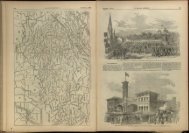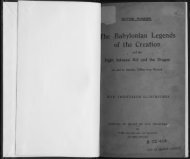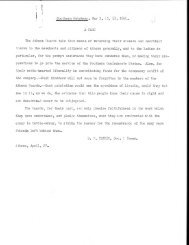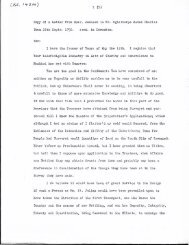THE SHE KING; OR, THE BOOK OF ANCIENT POETRY
THE SHE KING; OR, THE BOOK OF ANCIENT POETRY
THE SHE KING; OR, THE BOOK OF ANCIENT POETRY
You also want an ePaper? Increase the reach of your titles
YUMPU automatically turns print PDFs into web optimized ePapers that Google loves.
Ill<br />
248 <strong>THE</strong> <strong>BOOK</strong> OP POETKY. [PAET II.<br />
5 Some never hear a clamorous sound;<br />
Others toil on 'midst rude alarms.<br />
Some idle on their backs are found;<br />
And some bear loads with head and arms.<br />
6 Some feast, and fearless seek new joys;<br />
Some live in constant dread of blame.<br />
Some the harsh critic's work employs;<br />
Others their numerous duties claim.<br />
IL<br />
The Woo tseang ta Itcii; narrative. SOME <strong>OF</strong>FICER. OVER-LOADED<br />
IN <strong>THE</strong> <strong>KING</strong>'S SEEVICE. THINKS IT BETTER TO TKY AND DISMISS HIS<br />
TROUBLES FROM HIS MIND.<br />
The Preface says that the writer here expresses his regret for having<br />
recommended unworthy persons—"littlemen"—to public employments;—<br />
regret which is in vain. This view is found in Seun K'ing and in Han<br />
Ying. Such a fact may have given its origin to the piece ; but it is<br />
better to take the homely lines in their most general reference.<br />
1 Push not the cart you stand behind;—<br />
You'll only raise the dust. Nor dwell<br />
On your anxieties of mind;—<br />
You'll Only make yourself unwell. .<br />
2 Push not the cart you stand behind;—<br />
The dust will only blind your view.<br />
Dwell not on things that vex your mind;—<br />
You never thus can see them true.<br />
3 Push not the cart you stand behind;—<br />
The dust will but becloud your eyes.<br />
Heed not the troubles of youf mind ;—<br />
'Twill weight you as you seek to rise.<br />
III.<br />
The Seaott ming ; narrative. As <strong>OF</strong>FICER, KEPT LONG ABROAD ON<br />
DISTANT SERVICE, DEPL<strong>OR</strong>ES <strong>THE</strong> HARDSHIPS <strong>OF</strong> HIS LOT, AND TEN<br />
DERS GOOD ADVICE TO HIS M<strong>OR</strong>E F<strong>OR</strong>TUNATE FRIENDS AT COURT.<br />
We must suppose that the speaker here was an officer of high rank in<br />
command of the expedition to which he refers, and that the expedition<br />
A\ as towards the north. This latter point we infer from the mentiou<br />
BE VI. III.] <strong>THE</strong> <strong>BOOK</strong> <strong>OF</strong> <strong>POETRY</strong>. 249<br />
made of winter, for we do not know where the wild country of K'ew,<br />
that appears in st. 1, was. The last line of the same stanza speaks of<br />
the " net of crime,"—an expression for justice strictly administered. The<br />
same conception occurs in the Vedic hymns, e. g., that to Varuna, in the<br />
Atharnaveda (IV. 16), ends :—" May all thy fatal nooses, which stand<br />
spread out seven by seven and threefold, catch the man who tells a lie;<br />
may they pass by him who tells the truth." See Max Miifler's Lecture<br />
on the Vedas.<br />
1 0 Heaven above, before whose light<br />
Revealed is every deed and thought,<br />
To thee I cry.<br />
Hither on toilsome service brought,<br />
In this wild K'ew I watch time's flight,<br />
And sadly sigh.<br />
The second month had just begun,<br />
When from the east we took our way.<br />
Through summer hot<br />
We passed, and many a wintry day.<br />
Summer again its course has run.<br />
0 bitter lot!<br />
There are my compeers, gay at court,<br />
While here the tears my face begrime.<br />
I'd fain return.<br />
But there is that dread net for crime !<br />
The fear of it the wish cuts short.<br />
In vain I burn !<br />
2 Ere we the royal city left,<br />
The sun and moon renewed the year.<br />
We marched in hope.<br />
Now to its close this year is near.<br />
Return deferred, of hope bereft,<br />
All mourn and mope.<br />
My lonesome state haunts aye my breast,<br />
While duties grow, and cares increase,<br />
Too hard to bear.<br />
Toils that oppress me never cease ;<br />
Not for a moment dare I rest,<br />
Nigh to despair.<br />
I think with fond regard of those,<br />
Who in their posts at court remain,<br />
My friends of old.<br />
P








